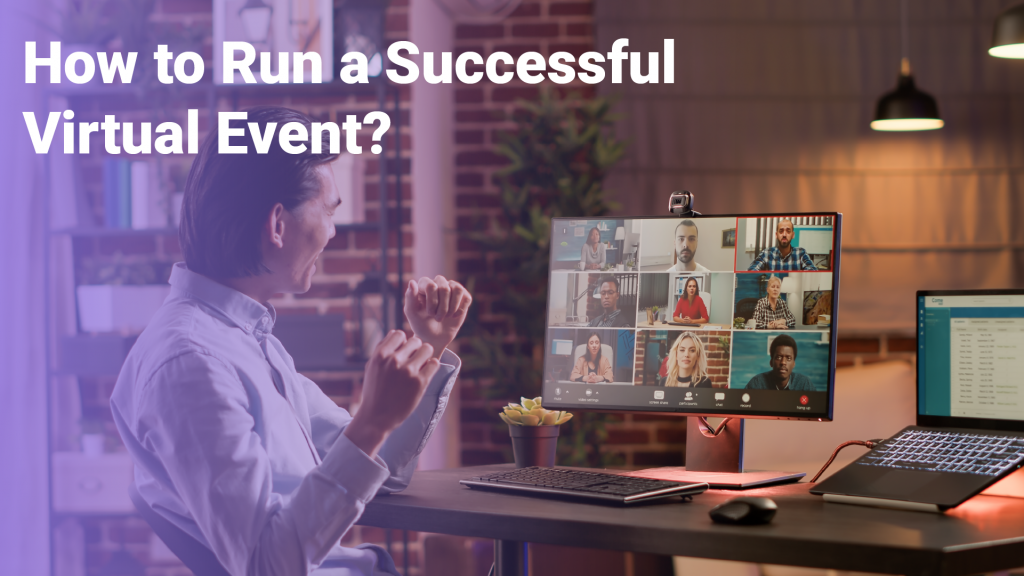
Discover essential tips and tricks to make your virtual event a success, from engaging attendees to effective planning.
Virtual events have become the norm recently as people continue to work and socialize from the safety of their homes. In the world of events, it has become essential for organizers to plan and execute virtual events to engage their audience while ensuring their safety.
Virtual events offer event planners flexibility, cost savings, and a broader audience reach through digital platforms, making them an excellent option. However, engaging and retaining the attention of virtual attendees takes work and requires careful planning and execution.
In this blog, we offer some tips to help event planners run successful virtual events.
These tips include defining goals and objectives, selecting the right platform, planning and rehearsing, engaging the audience, collaborating with sponsors/partners, promoting the virtual event, measuring success, fostering networking opportunities, being creative, and providing on-demand access.
By following these tips, event planners can deliver exceptional virtual events and offer attendees a unique and engaging experience, just like in-person events.
How Can You Run a Successful Virtual Event?
The events industry has changed significantly over the past year – traditional in-person events have been replaced by virtual events, driving significant growth in the virtual events space.
Event planners must rethink their strategies to host and run successful virtual events.
While virtual events provide a unique opportunity for organizers to reach a wider audience and leverage digital platforms, the key to a successful event is careful planning, audience engagement, and post-event evaluation.
Here are some tips on how to run a successful virtual event.
Define the Objectives
Defining the objectives is essential for any event, and virtual events are no different. Determine what you want to achieve with the event.
Is it to boost brand awareness, increase sales, improve customer engagement, or all of the above?
Identifying objectives will help you create a clear strategy for the event and guide how you engage with your audience.
Choose the Right Platform
Choosing the right virtual platform is crucial. There are many options available in the market, and each platform has unique features and capabilities.
Look for a platform that is user-friendly and offers the necessary features like live streaming, audience polling and interactive Q&A, screen sharing, and chat functions.
It is also important to ensure the platform is secure, robust, and scalable to handle your event’s requirements.
We suggest you try our platform Huddlexr.com. It is one of the Best Virtual Event Platforms. You can check the features and pricing here.
Plan and Rehearse
Virtual events require planning and rehearsal, just like in-person events. Create an event timeline and a script to ensure that everything runs smoothly.
Practice the event sequence, transitions, and technical set-up to avoid issues during the live event.
Engage the Audience
Engaging the audience is critical, ensuring active participation and making the event memorable. Some ways to keep the audience engaged include interactive polls, Q&A sessions, live chats, gamification, and virtual networking sessions.
Mix up the content format to keep attendees engaged and offer ample breaks to help avoid “Zoom Fatigue.”
Leverage Sponsorship and Partnership Opportunities
Collaborate with brands and potential sponsors to help support your event and deliver high-value content.
Sponsors can get involved through sponsorship packages or by hosting their event within your virtual event platform.
Creating a valuable partnership helps increase brand awareness, boost revenue, and increase the value proposition to attendees.
Promote Your Virtual Event
Promotion is key to the success of any event, and virtual events are no exception. Utilize social media, email marketing, and paid advertising to promote the event to your target audience.
Create a buzz in advance of the event, packaging it in such a way that attendees know what they stand to gain from attending.
Measure and Analyze Success
Measuring the impact of your virtual event is an important step that shouldn’t be skipped.
Evaluate metrics like attendance rates, engagement rates, feedback, and overall satisfaction levels from attendees to understand the success of your event.
Use insights from attendees and participants to improve future events.
Foster Virtual Networking Opportunities
People attend in-person events for the opportunity to make connections and network.
Virtual events offer the same opportunities, with features like virtual lounges, speed networking sessions, and dedicated virtual rooms for attendees.
Encourage attendees to network, promote virtual introductions, and utilize virtual business cards that offer contact information.
Be Creative
Make your event creative and interactive. Consider incorporating augmented or virtual reality technology or interactive gamification features to create a unique, memorable experience that stands out.
Creative content works well in retaining the attention of attendees, especially in virtual settings that can be prone to low engagement.
Provide On-Demand Access
Giving attendees access to on-demand event content is essential.
Not everyone can attend the event live, and providing access later in time allows attendees to get value from the event at their convenience.
You Can Try HuddleXR – It Is Very Easy To Run A Successful Virtual Event With HuddleXR
Huddlexr.com is a Virtual Event Platform that allows organizations to host events, conferences, and webinars in a virtual environment. The platform provides a range of features, including live streaming, video conferencing, virtual exhibition booths, and interactive networking tools.
One potential benefit of Huddlexr.com is its ease of use. The platform is designed to be user-friendly, with a simple and intuitive interface that allows organizers to set up and manage events effortlessly.
Huddlexr.com also offers a high level of customization, allowing organizers to tailor their virtual events to their specific needs. The platform offers a range of templates and design options that can be customized to match the branding of the event or organization.
In addition, Huddlexr.com provides robust analytics and reporting tools, allowing organizers to track attendee engagement and gather data on the effectiveness of their events.
Overall, Huddlexr.com is one of many virtual event platforms available on the market. It may be worth considering based on its features and capabilities, as well as individual needs and preferences.
Conclusion
Running a successful virtual event requires careful planning, engagement, and innovation. With the right platform, scripting, and rehearsal time, you can create a virtual experience that keeps attendees engaged, fosters networking opportunities, and delivers valuable content. Track event metrics and gather feedback to continuously improve your event strategy and deliver a more meaningful experience to attendees. By leveraging digital strategies that align with your event goals, you can leverage the benefits of virtual events to reach a global audience, all while maximizing your return on investment.







